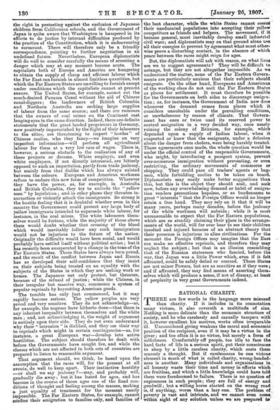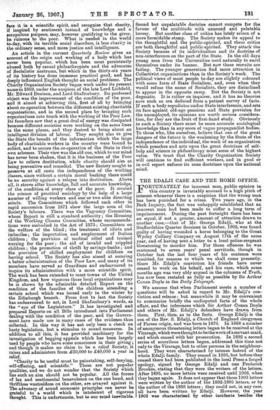RATIONAL CHARITY.
THERE are few words in the language more misused than charity. If it includes in its connotation many virtues, it also covereth a multitude of sins. Nothing is more delicate than the economic structure of society, and he who carelessly and casually tampers with it, however excellent his motives, works often irreparable ill. Unconsidered giving weakens the moral and economic' position of the recipient, even if it may be a virtue in the giver; and too often it is no virtue, but merely a form of selfishness. Comfortably off people, too idle to face the hard facts of life in a serious spirit, put their consciences to sleep by a little careless charity, which costs them scarcely a thought. But if carelessness be one viciond element in much of what is called charity, wrong-headed. ness is another. Many individuals and organisations in . all honesty waste their time and money in efforts which are fruitless, and which a, little knowledge could have told them were foredoomed to failure. There is no question of supineness in such people; they are full of energy and goodwill ; but a willing horse started on the wrong road is, if anything, worn, than a lazy one. The problem of. poverty Is vast and intricate, and we cannot even conw. within sight of any solution 'unless we' are prepared W face it in a scientific spirit, and recognise that charity, if inspired by sentiment instead of knowledge and a scrupulous purpose, may, however gratifying to the giver, be ruinous to the poor. What is needed in the world today, with its terrible social disorders, is less charity in the ordinary sense, and more justice and intelligence.
An article in the current Quarterly Review gives an amount of the origin and working of a body which has never been popular, which has been most persistently abused both by casual philanthropists and the advocates of Socialistic nostrums, but which in the thirty-six years of its history has done immense practical good, and has deeply influenced English thought on social problems. The Charity Organisation Society began work under its present name in 1869, under the auspices of the late Lord Lichfield, Mr. Edward Denison, and Lord Shaftesbury. Its professed object was the improvement of the condition of the poor, and it aimed at achieving this, first of all by bringing about co-operation between the different existing charitable organisations, and in the second place by bringing such organisations into touch with the working of the Poor Law. Its founders saw that a great deal of energy was dissipated because different societies were working on the same lines in the same places, and they desired to bring about an intelligent division of labour. They sought also to give the State the benefit of the information which the large body of charitable workers in the country were bound to collect, and to secure the co-operation of the State in their own schemes. Their view was the old one, which to our mind has never been shaken, that it is the busiuess of the Poor Law to relieve destitution, while charity should aim at being preventive and remedial. The new Society sought to preserve at all costs the independence of the working classes, since without a certain moral backing there could be no security against a relapse into destitution. Above all, it strove after knowledge, full and accurate knowledge, of the condition of every class of the peon It created the science of practical sociology by the help of a large number of willing workers and one or two able directing minds. The Committees which followed each other in rapid succession from 1871 show the large area of the Society's labours. There was the Vagrancy Committee, whose Report is still a standard authority ; the Housing of the Workiug Classes Committee, whose recommenda.- tions were embodied in the Act of 1875; Committees on the welfare of the blind ; the treatment of idiots and imbeciles ; the importation and employment of Italian children ; the provision of medical relief and trained nursing for the poor ; the aid of invalid and crippled children ; the promotion of thrift by savings-banks ; and the provision of skilled employment for children on leaving school. The Society has also aimed, at securing a better administration of the Poor Law, and many of its members have served as Guardians and endeavoured to inspire its administration with a more scientific spirit. The work has been extended to most towns of the United Kingdom, and how vigorous these local organisations may be is shown by the admirable detailed Report on the condition of the families of the children attending a certain school which was issued early in the winter by the Edinburgh branch. From first to last the Society has endeavoured to act, in Lord Shaftesbury's words, as the "eye of the Legislature." It has investigated and prepared Reports on all Bills introduced into Parliament dealing with the condition of the poor, and the Govern- ment have made use in many cases of the evidence thus collected,. In this way it has not only been a check on hasty legislation, but a, stimulus to sound measures. In addition to all this, it has provided machinery for the investigation of begging appeals which has been largely used by people who have some conscience in their giving ; and though it makes no claim to be a relief Society, it raises and administers from 230,000 to £40,000 a year in relief.
"Charity to be useful must be painstaking, self-denying, self-effacing, and scientific." These are not popular qualities, and we do not wonder that the Society which has such an aim should, not be popular. All the forces of lax and sentimental benevolence on the one hand, and thriftless wastreldom on the other, are arrayed against it. The advocacy of sound economic principles can never be grateful to a world which is intolerant of rigorous thought. This is unfortunate, but to our mind inevitable. Sound but unpalatable doctrine cannot compete for the favour of the multitude with unsound and palatable heresy. But another class of critics has lately arisen of a more formidable stamp. The Society makes its appeal to the thoughtful and the public-spirited, and these critics are both thoughtful and public-spirited. They attack the Society because of its individualism and its doctrine of non-interference on the part of the State. In the old days young men from the Universities used naturally to enrol, themselves under its banner. But now these recruits are failing. The younger generation find more attraction in Collectivist organisations than in the Society's work. The political views of most people to-day are slightly coloured with some form of State Socialism, and, even when they would refuse the name of Socialists, they are disinclined to appear in the opposite camp. But the Society is not dogmatic. It is rather an inquirer, and it has no theories save such as are deduced from a patient survey of facts. If such a body repudiates undue State interference, and sets its face against old-age pensions and State provision for the unemployed, its opinions are worth serious considers... tion, for they are the fruit of first-hand study. Obviously in such a Society there must be more accurate sociological knowledge than in any score of vague propagandist bodies. To those who, like ourselves, believe that one of the great dangers of the future is the weakening by the State of the independence of the individual, the work of an organisation which preaches and acts upon the great doctrines of self- help and science in philanthropy must seem of the highest value. We trust that the Charity Organisation Society will continue to find sufficient workers, and in good or in evil report enforce its sane doctrines upon the national mind.























































 Previous page
Previous page